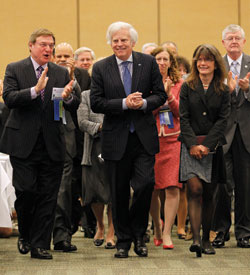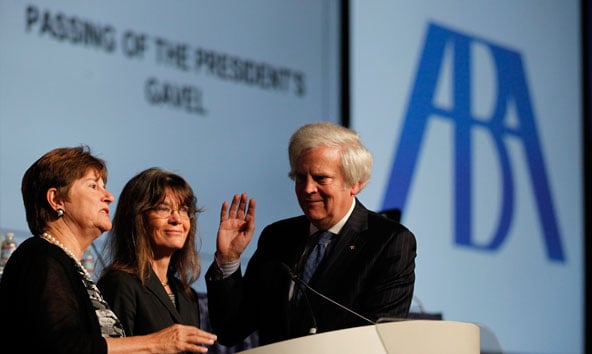New ABA President James Silkenat sets his agenda

James Silkenat (center) announces his Legal Access Jobs Corps iniative after receiving the ceremonial gavel as ABA president. Photo by Tony Avelar.
Accepting the presidential gavel, new ABA President James Silkenat of New York City laid out a series of initiatives he intends to push during his term that runs until August 2014.
In what may turn out to be Silkenat’s signature project, he discussed the joining of two pressing issues for the profession: access to justice and the dearth of jobs for new lawyers. Silkenat created the Legal Access Jobs Corps Task Force to look at the problem, particularly reviewing efforts underway by state and local bars. “We must find a way to improve the fit between the needs of our profession and those of society,” Silkenat said. He also called for ABA action on gun violence, immigration problems and election law reform.
HOUSE ACTION
In other annual meeting action, the ABA House of Delegates:
• Approved a resolution calling for the modification or creation of laws at all levels of government to fight hacking into computer systems used by lawyers and law firms. Further, it urges the U.S. government to work with other nations and groups “to develop legal mechanisms, norms and policies” to deter, prevent and punish such breaches. Judith Miller, co-chair of the Cybersecurity Legal Task Force that developed it, said this is the beginning of an expected series of resolutions for the policymaking body to consider concerning cyberthreats. The resolution was sponsored by the task force; the standing committees on Client Protection, Ethics and Professional Responsibility, Law and National Security, Professional Discipline, and Technology and Information Systems; and the Law Student Division. Also sponsoring were the sections of Business Law; Environment, Energy and Resources; Law Practice Management; Litigation; and Science & Technology Law.
• Unanimously passed a resolution urging federal, state, local and territorial governments to pass legislation curtailing the availability and effectiveness of the use of “gay panic” and “trans panic” defenses by criminal defendants. These defense strategies seek to excuse crimes by saying that victims’ sexual orientation caused the assailants’ violent reactions to them. The ABA recommends that courts, when asked, instruct juries to ignore victims’ gender or sexual orientations during deliberations; it also recommends that laws might ban any use of such defenses in noncapital cases. The resolution was sponsored by the sections of Criminal Justice and Individual Rights and Responsibilities; the Young Lawyers Division; the Center for Human Rights; and the commissions on Domestic and Sexual Violence, Racial and Ethnic Diversity in the Profession, Sexual Orientation and Gender Identity, and Youth at Risk.
• Approved a resolution urging that attorney-client privilege apply when law firms have in-house counsel as ethics advisers to other lawyers in the firms working on matters that pertain to work for clients. The measure stems from the increasing complexity of regulation, rules of professional conduct and greater disclosure obligations under legislation such as the Sarbanes-Oxley Act. The resolution was sponsored by the sections of Business Law; Law Practice Management; Real Property, Trust and Estate Law; Taxation; and Tort Trial and Insurance Practice; and also by the bar associations of the city of Beverly Hills, and the states of Illinois and New York.

New ABA President, James Silkenat of New York City, accepts the presidential gavel. Photo by Tony Avelar.



